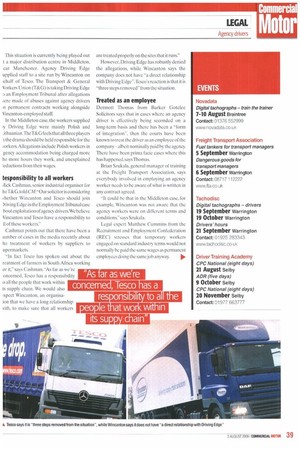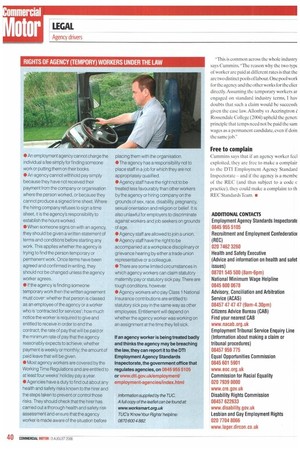Who's responsible'
Page 38

Page 39

Page 40

If you've noticed an error in this article please click here to report it so we can fix it.
A driver agency faces allegations that it exploited foreig
workers contracted to VVincanton, but who is responsible fc the rights of such workers? Sally Nash report
picture the scene: an agency worker supplied by a recruitment firm to we at a distribution centre run by a lar logistics company on behalf of a househol name food retailer.The agency worker is doi the same job as the staff directly employ by the logistics firm but on inferior ten and conditions. Just who is responsible I the agency staff? The recruitment firm? T distribution company? Or the retailer? This situation is currently being played out t a major distribution centre in Middleton, ear Manchester. Agency Driving Edge upplied staff to a site run by Wincanton on chaff of Tesco. The Transport & General Vorkers Union (T&G) is taking Driving Edge D an Employment Tribunal after allegations /ere made of abuses against agency drivers ,n permanent contracts working alongside Vincanton-employed staff.
In the Middleton case, the workers supplied ly Driving Edge were mainly Polish and Athuanian.TheT&G feels that all three players the drama should be held responsible for the vorkers. Allegations include Polish workers in gency accommodation being charged more he more hours they work, and unexplained leductions from their wages,
responsibility to all workers
/lick Cashman, senior industrial organiser for he T&G.told CM: "Our solicitor is considering vhether Wincanton and Tesco should join }riving Edge in the EmployrnentTribunal case bout exploitation of agency driyers,We believe Vincanton and Tesco have a responsibility to II of these workers," Cashman points out that there have been a lumber of cases in the media recently about he treatment of workers by suppliers to upermarkets.
"In fact Tesco has spoken out about the reatment of farmers in South Africa working or it," says Cashman. -As far as we're oncerned, Tesco has a responsibility o all the people that work within ts supply chain. We would also :xpect Wincanton. an organisaion that we have a long relationship vith, to make sure that all workers are treated properly on the sites that it runs."
However, Driving Edge has robustly denied the allegations, while Wincanton says the company does not have -a direct relationship with Driving Edge".Tesco's reaction is that it is "three steps removed" from the situation.
Treated as an employee
Dermott Thomas from Barker Gotelee Solicitors says that in cases where an agency driver is effectively being seconded on a long-term basis and there has been a "form of integration", then the courts have been known to treat the driver as an employee of the company—albeit nominally paid by the agency. There have been prima facie cases where this has happened, says Thomas.
Brian Szukala, general manager of training at the Freight Transport Association, says everybody involved in employing an agency worker needs to be aware of what is written in any contract agreed.
"It could he that in the Middleton case, for example, Wincanton was not aware that the agency workers were on different terms and conditions." says Szukala.
Legal expert Matthew Cummins from the Recruitment and Employment Confederation (REC.) stresses that temporary workers engaged on standard industry terms would not normally be paid the same wages as permanent employees doing the same job anyway. "This is common across the whole industry says Cummins. "The reason why the two type of worker are paid at different rates is that the arc two distinct pools of labour. One pool wor14 for the agency and the other works for the clier directly. Assuming the temporary workers ar engaged on standard industry terms, I hay doubts that such a claim would be successli given the case law. Allonby vs Accringtron Rossendale College (2004) upheld the genen principle that temps need not be paid the sam wages as a permanent candidate, even if doin the same job."
Free to complain
Cummins says that if an agency worker feel exploited, they are free to make a complair to the DTI Employment Agency Standard Inspectorate — and if the agency is a membc of the REC (and thus subject to a code c practice), they could make a complaint to th REC Standards Team. •




























































































































































































